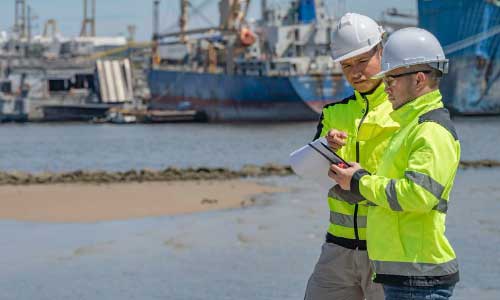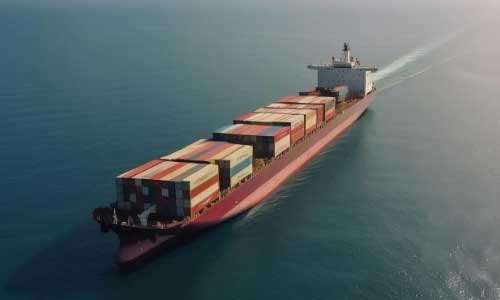Marine Cargo Insurance - A Complete Guide
Marine cargo insurance covers businesses that ship goods, whether domestically or internationally. It provides financial protection against the risks of damage, loss, or theft of cargo during transit.

- Best Coverage for the Lowest Price
- Quick & Hassle-free Policy Issuance
- Dedicated Teams for express Claims
Safeguard Your Business from Sea’s Uncertainties - Act Now !
Given the global nature of trade where the goods are transported across sea, land, and air, having the right insurance is crucial to mitigate potential risks. These risks include accidents, piracy, and damage during loading or unloading.
This article will walk you through the different types of marine cargo insurance available, ensuring you make an informed decision to protect your goods in transit.
What is Marine Cargo Insurance?
Marine cargo insurance policy is designed to protect goods that are being transported over water. This insurance applies to various stages of the transportation process, from the moment the goods leave the warehouse until they reach their final destination.
In simple terms, marine cargo insurance is a safety net for businesses involved in shipping, covering a range of risks that could otherwise lead to significant financial loss.
Benefits of Marine Cargo Insurance Policy
Marine cargo insurance coverage is essential for managing the inherent risks of global trade, ensuring business continuity, and providing financial security.
-
Protection Against Unforeseen Events
Marine insurance safeguards against various unexpected scenarios, such as natural disasters, accidents, or piracy, providing peace of mind to businesses involved in global shipping.
-
Risk Mitigation
It helps reduce the impact of unpredictable maritime events, such as accidents, storms, or piracy, ensuring that unforeseen circumstances don’t cause significant harm to your business.
-
Business Continuity
In case of damage to ships or cargo, marine cargo insurance allows for swift repairs and replacements. This ensures your operations continue without prolonged delays and keeps your business running smoothly.
-
Legal Compliance
It is often a requirement in export contracts and international shipping agreements. By having the right coverage, businesses can ensure they meet their legal obligations and remain compliant with trade laws.
-
Global Trade Support
As international trade grows, marine cargo insurance plays a crucial role in mitigating financial risks involved in transporting goods across the globe. This helps create a more secure and reliable shipping environment for businesses.
-
Efficient Claims Process
In the event of a loss or damage, marine cargo insurance often features a streamlined claims process. This minimises disruptions to operations, helping businesses recover more quickly.
-
Disaster Recovery
For fleet owners, marine insurance helps cover the high costs of emergencies like shipwrecks, collisions, or hijackings. Coverage for towing, repairs, and other contingencies ensures that business operations remain unaffected.
Types of Marine Cargo Insurance Policies
Here are the different types of Marine Cargo Insurance, each covering different requirements —
Single Cargo Policy
It is ideal for businesses or individuals who need coverage for a one-time shipment. If you're sending goods just once, this policy will protect that specific shipment from the moment it leaves your warehouse until it reaches its destination.
The policy covers potential risks such as damage, theft, or loss during transportation by sea, air, or land. The only drawback is you need to arrange coverage for each new shipment.
Open Cargo Policy
An Open Cargo Policy is designed for businesses that ship goods frequently or regularly. This policy provides continuous coverage for all shipments within a specified time period (usually a year). This eliminates the need to arrange coverage for each shipment individually.
This type of policy is typically preferred by companies involved in international trade that send goods regularly, such as wholesalers, manufacturers, or importers/exporters.
What is Covered Under Cargo Insurance?
Marine Cargo insurance coverage includes comprehensive coverage for various risks associated with the transportation of goods, whether by sea, land, or air.
We have mentioned the key elements covered under this insurance —
✅ Natural Disasters like storms, volcanic eruptions, and lightning during transit
✅ Accidents and Collisions, grounding, or overturning coverage
✅ Distressed Port Risks or damages during unloading at unsafe ports
✅ Fire and Explosion or other unexpected incidents loss coverage
✅ War and Piracy protection against more risks like political instability and piracy
✅ Theft, Kidnapping, and Sabotage insurance for losses
✅ Liability for Goods to protect the cargo owner against damage or loss during transit.
✅ Losses During Multi-Modal Transit coverage throughout the entire journey, from inland transport to seaport and across seas.
What is Not Covered Under Margo Cargo Insurance Policy?
These exclusions highlight areas not covered under a typical marine cargo insurance policy —
❌ Intentional Loss or Damage by the owner or parties involved
❌ Poor Packaging causing damage to the goods inside
❌ War, Strikes, and Riots losses, unless specifically covered
❌ Civil Commotion causing the damage to the stock
❌ Bankruptcy and Financial Failures of the carrier or shipper
❌ Insolvency losses of any party in the supply chain
Important: The exclusions and inclusions may vary depending on the provider you choose. We recommend you to always carefully review the marine cargo insurance policy wording.
Mode of Transport Covered in Marine Cargo Insurance Policy
Businesses use different types of transportation methods to export or import goods. Here are the ones that are covered —
- Items shipped by sea transportation like sea vessels
- Aircraft transportation coverage
- Goods moved by trucks, trains, or other road vehicles
- Coverage for goods shipped via canals, rivers, or others
Marine Cargo Insurance Cost
The cost of marine cargo insurance is influenced by several key factors —
- Type of Cargo: Different types of goods, such as fragile or high-value items, may require higher premiums
- Mode of Transportation: Costs can vary depending on whether the goods are transported by sea, air, or land
- Coverage Type: The level of coverage (e.g., all-risk or named perils) affects the cost
- Ports Used: Ports in higher-risk regions may contribute to higher insurance costs
- Age and Type of Vessel: Older vessels or those considered high-risk may increase the premium
Factors to Consider When Purchasing Marine Cargo Insurance Policy
When purchasing cargo insurance, it’s crucial to consider several factors to ensure your shipment is properly covered.
Here are the key points to keep in mind —
- Shipment Value: Your value of goods being transported directly influences the amount of coverage you’ll need. Higher-value shipments require more comprehensive coverage to protect against potential losses
- Location: Shipments to high-risk or politically unstable regions may require additional coverage, increasing the overall cost
- Quotes: It’s important to get quotes from multiple lenders to compare coverage options, benefits and prices
- Risk Tolerance and Budget: Evaluate your company’s risk tolerance and budget to determine the level of coverage you need
- Read the Policy Carefully: Ensure you fully understand the policy terms, coverage limits, and exclusions. Some risks may not be covered under a standard policy, so make sure to ask about specific exclusions and optional coverage add-ons
For more detailed information about the claim process or documentation required, you can read our article on Marine Insurance.
Frequently Asked Questions
Q1. Is Marine Cargo Insurance compulsory?
Marine cargo insurance is not always compulsory, but it is highly recommended, especially for international shipments, to protect against potential losses during transit.
Q2. What is the difference between marine insurance and marine cargo insurance?
Marine insurance covers the entire vessel, including hull, machinery, third-party liability, and the goods carried. In contrast, marine cargo insurance specifically covers the goods being shipped from origin to destination.
Q3. What is not covered in cargo insurance?
Cargo insurance typically excludes losses caused by intentional misconduct, delays, wear and tear, ordinary leakage, and losses in weight or volume.
Q4. Who pays for marine cargo insurance?
The shipper or cargo owner typically purchases marine cargo insurance to cover their goods' value, allowing underwriters to seek recovery from responsible parties if necessary.
Q5. How to claim marine cargo insurance?
To file a claim, submit the following documents:
- Original Invoice
- Shipping Specification
- Claim Bill
- Survey Report
- Original Insurance Certificate
Get Other SME Insurance in UAE
More From Marine Insurance
- Recent Articles
- Popular Articles








.png)




